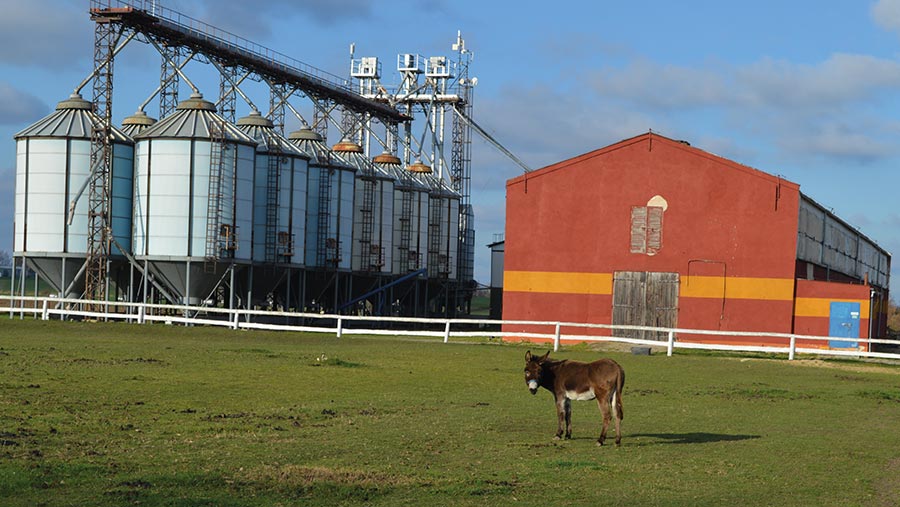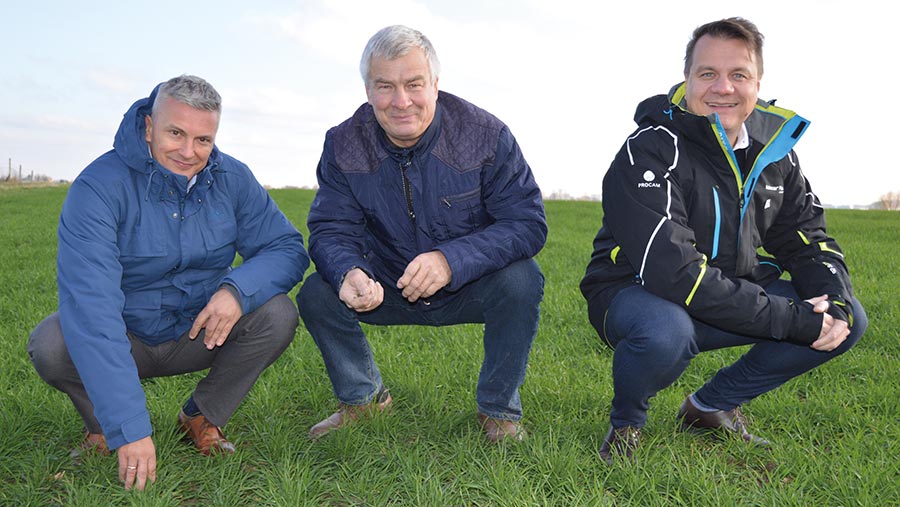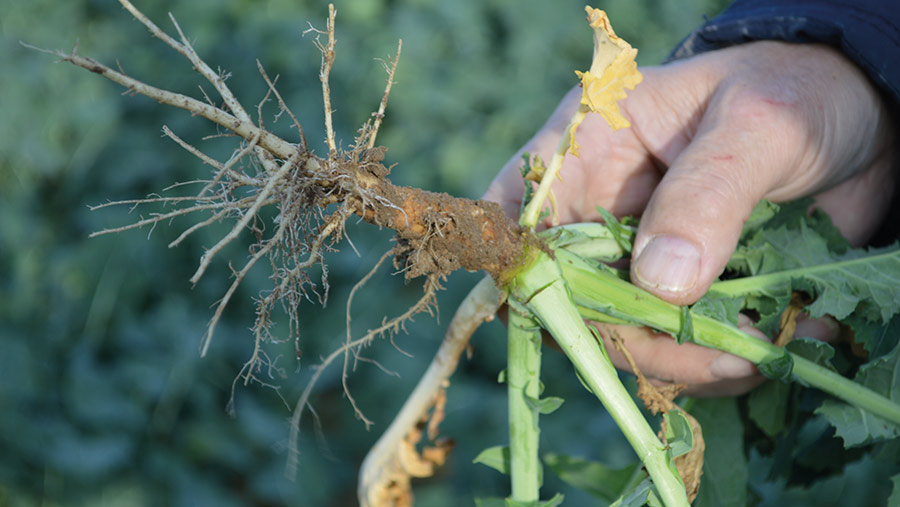Polish growers see high OSR yields after move to biologicals
 © MAG/David Jones
© MAG/David Jones Polish grower Julian Grygolec is harvesting bumper oilseed rape yields of 5t/ha across his farm with a focus on using biological products and foliar feeds to keep his crops well supplied with essential nutrients.
The 5t/ha figure is his average yield across 150ha of rapeseed in the summer of 2022 on his fertile soils in northern Poland, using a relatively low level of nitrogen fertiliser at 180kg/ha.
“We usually get good yields on this farm, so 5t/ha is normal, 4t/ha would be a disaster,” he jokes to Farmers Weekly.
See also: Grower’s biological farming system eliminates fungicide use
The heavy soils on his 530ha farm in Pomerania, 25 miles south of the Baltic port of Gdansk, tend to give good yields even in dry springs and summers – which are becoming more commonplace.
His winter wheat averaged 9.2t/ha in 2022, in a range from 8t/ha to 11t/ha, and his sugar beet averaged 80t/ha.
Biological use
He has been using the biological soil improver RevitalPro for the past six years, applied in the autumn and worked into the soil, and he is convinced it is helping to improve the soil structure on the heaviest of his land.
He has seen increased earthworm numbers and the soils are easier to work.
In addition, he is using the nitrogen-enhancing biological AzotoPower, which has helped him cut his nitrogen needs by 60kg/ha on his rapeseed and still maintain good yields.
This is applied at drilling time, and then in the spring, and does not need incorporating into the soil.

Dariusz Wyczling, Julian Grygolec and Michal Cisnak © MAG/David Jones
Mr Grygolec is being advised by Rafal Glodnicki from agronomy group ProCam.
The group has 120 agronomists working across Poland and is the exclusive distributor for these biological products, manufactured by the Polish group Bio-Liden.
ProCam has expanded rapidly in Poland in the past 18 years, led by managing director Michal Ciszak and head of agriculture Dariusz Wyczling.
In addition, a programme of foliar feeds applied four to five times throughout the spring season has also help his crops towards high yields.
These can be applied with other products, such as fungicides and insecticides, to minimise the number of passes across the land.
Fertiliser price hikes
Mr Grygolec has turned to biologicals and foliar crop nutrition to cope with the sharp rise in nitrogen fertiliser prices and the often limited availability of nitrogen caused by the sharp hike in energy prices following the Ukrainian-Russian conflict.
The war just across the Polish-Ukrainian border has raised grain and rapeseed prices across the world, but domestic prices can fluctuate.
When Ukrainian grain is diverted by rail and road through Poland because of the restricted trade through Ukraine’s Black Sea ports it is sold on the Ukrainian market and depresses local prices
He is also focused on minimal disturbance when cultivating his soils to retain moisture in dry weather, with his farm only seeing an annual rainfall of 600mm, with less snow in the winter, as the last “hard” winter was in 2016.
He also has to cope with the effect of climate change with his oilseed rape flowering in April as night-time temperatures fall to -4C.
“Climate change is having an impact and making the risks bigger for a grower. We don’t know what to expect from the weather and we are having less snow, which means less water for the crops,” he says.
He has reduced ploughing on the farm to once every three to four years and this has brought an improvement in soil health as well as a move towards strip tillage for sugar beet.
Mr Grygolec farms 530ha of arable land, with 300ha of wheat, 150ha of oilseed rape and a sugar beet area of 50ha on a former state-run farm of which he was a director.
He was able to buy part of the farm when the land was privatised following the fall of communism.
Use of blends

© MAG/David Jones
He sows a blend of up to four different oilseed rape varieties in the mix, including Absolut and Batis, as he finds this gives him good yields and limits disease pressure.
He uses the biological DeliaStop from Bio-Liden to deter cabbage root fly infestations in the autumn and into winter.
His foliar feed programme incorporates ProLeaf Max, which provides micronutrients such as manganese, copper and some nitrogen, and also some Delta products, which provide micro and macro nutrients.
These are the same products Tim Lamyman on the Lincolnshire Wolds uses to produce his top-yielding crops,
For his main nitrogen applications, Mr Grygolec uses liquid early in the season, as it is more easily absorbed by plants, achieves a better spread and works better in dry conditions.
He then switches to solid nitrogen later in the season to avoid any scorching of the crop from concentrated liquid products.
His overall level of nitrogen fertiliser used on the oilseed rape has come down to 170-180kg/ha from the 240kg/ha he was using previously, without having a negative impact on crop yields.
He says he is at the high end of input spending for oilseed rape crops in Poland, but the result is worthwhile for his high-yielding crops.
He does admit the crop is more difficult and stressful to grow than winter wheat, but says the rewards are higher due to the high yields.
Champions League winner
Norbert Lipowski won the “Champions League” of top winter wheat yields in Poland, with a crop of 12.358t/ha.
This was as a result of him growing his 2022 harvested crop after a nitrogen-fixing bean crop, helped by favourable weather and using biologicals aimed at fixing more nitrogen.
His top yield came on his 180ha family farm in north-east Poland, in the Masurian Lakes area towards the Russian and Lithuanian border, where he farms with his brother and two sons.
He grows 100-110ha of winter wheat and last year’s crop of the variety Argument was the highest yield he has ever officially recorded.
He used the biological spray AzotoPower across all his winter wheat in the spring.
This allowed him to cut his use of bagged nitrogen by 30kg/ha down to 180kg/ha, while his turkey unit provides manure for the land once every four to five years.
The yield competition covers a range of crops from wheat to grain maize, is organised and run by agronomy group ProCam, and covers the whole of Poland.

